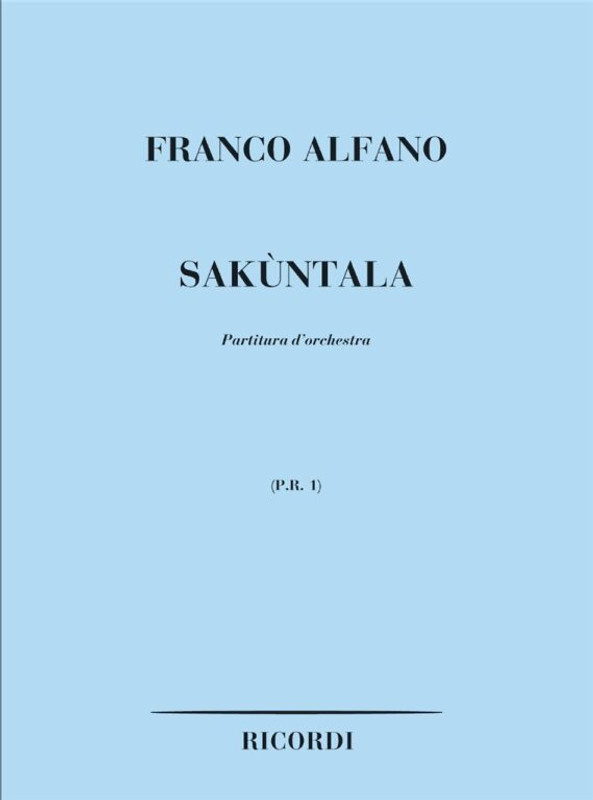Description
Franco Alfano: SAKZNTALA - Opera Full Score
Product Information
- Composer: Franco Alfano
- Setting: Opera Full Scores
- Genre: Stage Work
- Weight: 1.15 kg
- Published: 2000
- Catalog Number: PR00000100
- Other Reference: PR 1
- ISMN: 9790041900018 / 979-0041900018
Overview
"Sakùntala", an opera in three acts by Franco Alfano, stands as one of the most ambitious and evocative examples of early 20th-century Italian opera, notable for its refined lyricism, harmonic sophistication, and dramatic depth. Alfano, best known for completing Puccini’s Turandot, here demonstrates his own compositional voice, blending elements of late Romanticism, Impressionism, and exoticism with a highly individual sensibility.
The libretto, penned by Alfano himself, is adapted from “Abhijñānaśākuntalam” (“The Recognition of Sakùntala”), the classical Sanskrit drama by the great Indian poet Kālidāsa. The story follows Sakùntala, a virtuous and noble young woman raised in a hermitage, and King Duṣyanta, who falls in love with her. After a secret wedding, Duṣyanta returns to his palace, but a curse causes him to forget Sakùntala, and she is left alone and pregnant. Eventually, his memory is restored, and they are reunited. The opera explores themes of love, loss, fate, memory, and spiritual redemption, all set within a mythological and philosophical framework that lends the work both universal appeal and profound emotional resonance. Originally premiered in 1921 at the Teatro Comunale di Bologna, the opera was considered lost during World War II when the orchestral score and parts were destroyed in the bombing of Ricordi’s archives. However, Alfano reconstructed the opera from surviving materials, and this revised version became the standard performing edition. The 2000 Ricordi full score edition, edited from Alfano’s 1952 revision, provides the most complete and authoritative version of this remarkable work, preserving the composer’s meticulous orchestration and dramatic vision. Musically, Sakùntala is marked by sumptuous orchestration, a lush harmonic palette, and melodic lines that demand both vocal beauty and interpretive nuance. Alfano draws from a wide range of stylistic influences—Wagnerian leitmotif, Debussyan color, and Eastern modal inflections—while retaining an Italianate vocal elegance. The opera’s arias, duets, and choral scenes are woven into a continuous musical texture that enhances the narrative flow, while the orchestral writing evokes the mysticism and grandeur of the ancient Indian setting.
Italian Translation - Overview
"Sakùntala", opera in tre atti di Franco Alfano, rappresenta uno degli esempi più affascinanti e ambiziosi dell’opera italiana del primo Novecento. È un capolavoro caratterizzato da un lirismo raffinato, una scrittura armonica complessa e una profondità drammatica che lo distingue nell’ambito del teatro musicale del XX secolo. Alfano, noto soprattutto per aver completato Turandot di Puccini, trova qui una voce espressiva autonoma, mescolando elementi del tardo Romanticismo, dell’Impressionismo e dell’esotismo in uno stile personale e sofisticato.
Il libretto, scritto dallo stesso Alfano, è tratto dal celebre dramma sanscrito “Abhijñānaśākuntalam” (“Il riconoscimento di Sakùntala”) di Kālidāsa, uno dei massimi poeti dell’antica letteratura indiana. La vicenda narra l’amore tra Sakùntala, giovane di nobili origini cresciuta in un eremo, e il re Duṣyanta, che la sposa in segreto. A causa di una maledizione, il re dimentica Sakùntala, che resta sola e incinta. Solo più tardi, il ricordo ritorna e i due si ricongiungono. Il dramma affronta temi profondi come l’amore, la perdita, il destino, la memoria e la redenzione spirituale, in un intreccio narrativo che fonde mitologia e introspezione. L’opera fu rappresentata per la prima volta nel 1921 al Teatro Comunale di Bologna. Tuttavia, la partitura orchestrale originale andò perduta durante i bombardamenti della Seconda Guerra Mondiale che distrussero gli archivi della casa editrice Ricordi. Alfano, nonostante la difficoltà, riuscì a ricostruire l’opera da materiali rimasti, e la versione rivista del 1952 divenne quella definitiva. L’edizione in partitura completa pubblicata da Ricordi nel 2000 presenta proprio questa versione, offrendo un testo musicale autorevole e fedele alla visione del compositore. Dal punto di vista musicale, Sakùntala si distingue per un’orchestrazione sontuosa, una tavolozza armonica ricca e linee vocali eleganti e articolate. Alfano attinge a numerose influenze stilistiche—dal leitmotiv wagneriano ai colori debussiani, fino a suggestioni modali orientali—mantenendo però una forte identità lirica italiana. Le arie, i duetti e le sezioni corali si fondono in un continuum musicale che esalta la narrazione, mentre l’orchestra contribuisce a evocare l’atmosfera mistica e l’ambientazione mitica dell’India antica.
Product Features
- Format: Full Score
- Setting: Opera
- Publisher: Ricordi
- Weight: 1.15 kg
- Genre: Stage Work
Interesting Facts
- Composer Background: Franco Alfano (1875-1954) is best known for his operas, including "Cyrano de Bergerac" and "Risurrezione." He gained recognition for completing Puccini's "Turandot," which solidified his place in the operatic canon.
- Musical Style: Alfano's compositions are characterized by their lush orchestration and emotional depth, often reflecting influences from Wagner, Strauss, and the emerging neoclassicism of his time.
- Cultural Significance: "SAKZNTALA" is a testament to Alfano's ability to convey complex human emotions through music, making it a valuable addition to the repertoire of operatic works.
Italian Translation - Interesting Facts
-
Biografia del compositore: Franco Alfano (1875–1954) è noto soprattutto per le sue opere, tra cui Cyrano de Bergerac e Risurrezione. Acquisì particolare fama per aver completato l'opera incompiuta di Puccini, Turandot, consolidando così la sua posizione nel canone operistico del Novecento.
- Stile musicale: Le composizioni di Alfano si distinguono per la ricchezza dell’orchestrazione e la profondità emotiva, con evidenti influenze di Wagner, Strauss e della nascente corrente neoclassica del suo tempo.
- Rilevanza culturale: SAKÙNTALA rappresenta un esempio emblematico della capacità di Alfano di esprimere emozioni umane complesse attraverso la musica, costituendo un prezioso contributo al repertorio operistico del XX secolo.
Publishers
Published by Ricordi. All rights reserved under catalog number PR00000100 and ISMN 9790041900018 / 979-0041900018.
We value your feedback! Share your experience with this product to help others make informed decisions. Your review is important to us!
Hashtags
English:
#FrancoAlfano #SAKZNTALA #OperaScore #StageWork #Ricordi
















